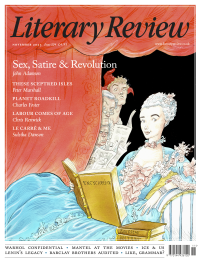Charles Foster
Where Animals Fear to Tread
Crossings: How Road Ecology Is Shaping the Future of Our Planet
By Ben Goldfarb
(W W Norton 384pp £24.99)
When Hazel, the rabbit at the centre of Watership Down, meets his first road, he thinks it is a river. It’s not surprising. Seabirds sometimes crash-land on shiny roads, mistaking them for the ocean. Hazel, when he investigates further, is scared. ‘Now that I’ve learnt about it’, he says, ‘I want to get away from it as soon as I can.’ Ben Goldfarb shares this sentiment. ‘Roads are, you might say, the routes of all evil,’ he declares in this masterly, readable and troubling survey of what roads do to us and to everything else.
There’s nothing new about roads. Six thousand years ago, before there were wheels, Mesopotamian navvies built mud-brick tracks. Nor is there anything new about road-related problems. Juvenal moaned that Rome’s traffic was ‘sufficient to wake the dead’ and Thomas Hardy mourned ‘the mole’s tunnelled chambers … crushed by wheels’ and the ‘lark’s eggs scattered’ by horse-drawn wagons at Waterloo. What is new is the overwhelming scale of the problem.
Juvenal didn’t know how lucky he was. Traffic noise doesn’t just take our minds off our dactylic hexameters; it kills us. A 2019 report found that noise, by increasing levels of stress hormones, reduced life expectancy by three years in the loudest Paris neighbourhoods. Perhaps, to be effective,

Sign Up to our newsletter
Receive free articles, highlights from the archive, news, details of prizes, and much more.@Lit_Review
Follow Literary Review on Twitter
Twitter Feed
Though Jean-Michel Basquiat was a sensation in his lifetime, it was thirty years after his death that one of his pieces fetched a record price of $110.5 million.
Stephen Smith explores the artist's starry afterlife.
Stephen Smith - Paint Fast, Die Young
Stephen Smith: Paint Fast, Die Young - Jean-Michel Basquiat: The Making of an Icon by Doug Woodham
literaryreview.co.uk
15th-century news transmission was a slow business, reliant on horses and ships. As the centuries passed, though, mass newspapers and faster transport sped things up.
John Adamson examines how this evolution changed Europe.
John Adamson - Hold the Front Page
John Adamson: Hold the Front Page - The Great Exchange: Making the News in Early Modern Europe by Joad Raymond Wren
literaryreview.co.uk
"Every page of "Killing the Dead" bursts with fresh insights and deliciously gory details. And, like all the best vampires, it’ll come back to haunt you long after you think you’re done."
✍️My review of John Blair's new book for @Lit_Review
Alexander Lee - Dead Men Walking
Alexander Lee: Dead Men Walking - Killing the Dead: Vampire Epidemics from Mesopotamia to the New World by John Blair
literaryreview.co.uk